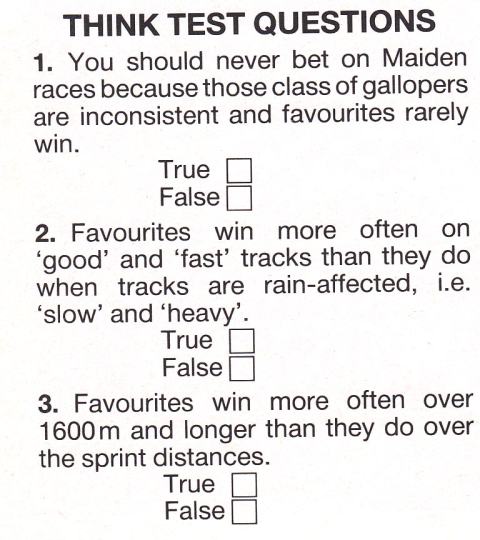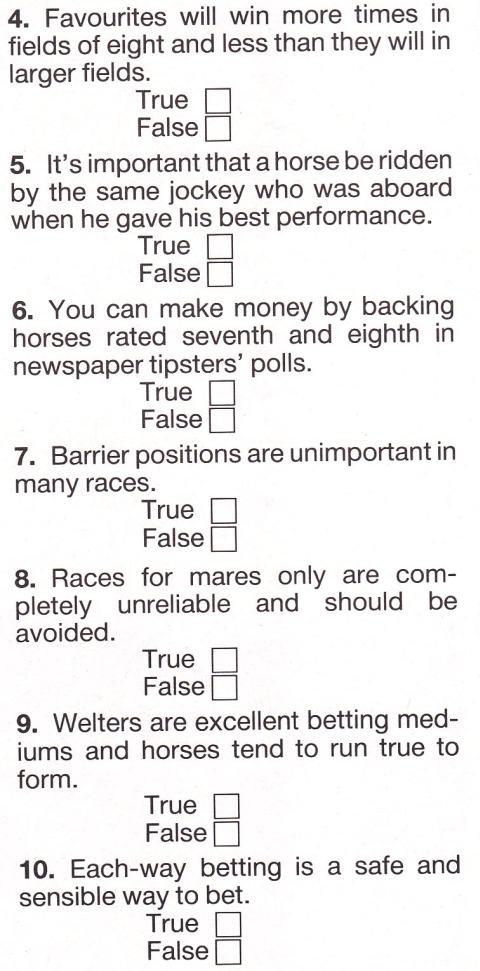Many things in racing are accepted as being absolutely true - and few punters ever bother to test the claims.
You'll probably get a surprise or two if you cared to look beyond what is said to be fact. I've been doing just that in recent weeks and I know you are going to be fascinated by my findings.
To make it interesting, I have turned the study into a Think Test. I've listed a series of commonly accepted racing maxims and you have to answer True or False to them. After you have done that, read on and find out whether you are right or wrong. My betting is that you'll be wrong more often than you are right!
The purpose of the ThinkTest is simple - it's to make you fully aware that not always can the old theories be relied upon. Too often, they have been based on inaccurate information or misguided assertions that, over the years, have become fact more byword of mouth than by any substance of actual evidence.
How often have you heard someone declare that a horse racing second-up cannot win. "They never win second-up," he'll say, with all the authority of someone who knows there is that one certainty in racing. Of course, horses do win second-up from a spell, and they win often. You cannot blindly accept that second-up means loss on the way. Each horse has to be considered on its merits, and its form and its past indicators.
Go through my Think Test and answer as truthfully as you can - then go on and see what I have to say.


Well, those are the 10 questions. Some you probably will decide are easy to answer, others you might have to give some thought to for a while. Tick your answers (with a pencil if you don't want to mark your precious copy of PPM) and then see how you fare.
I have listed at the bottom of this article my assessment of your judgement depending on how many of the Think Test questions you managed to get right.
Okay, let's get on with answering the questions posed. I have put the number of the question and immediately after it whether I consider it True or False.
1. False. There is a lot of nonsense talked about Maiden races. Sure, they are often contested by mediocre horses but even these horses tend to race in a consistent pattern. My studies of three years racing on Victorian country tracks shows that favourites win 32% of all Maiden events in that State. This is slightly higher than the national average for winning favourites. So, don't be put off by Maiden races but treat them as you would most other races by studying form carefully and operating on the assumption that form will be displayed in some sort of consistent pattern.
2. False. Wet tracks are often referred to as'traps'for punters but the fact is that favourites win just as often on tracks rated 'dead', 'slow' and 'heavy' as they do on firm tracks. The reason is that punters are well aware of which horses can handle rain-affected going and they know, too, which horses cannot. This allows a definite market to ensue. Wet trackers are usually consistent.
3. False. Even though horses have a longer time to settle down and race truly in long distance events, this makes no apparent difference to the percentage of winning favourites. Favourites seem to win just as many sprint events as they do longer races.
4. False. At first glance, it might seem that the assertion made in this instance is true - that favourites in fields of eight and less win more times than favourites in larger fields. My statistics show that, overall, the same percentage, around 31 %, is maintained in all field sizes over a period of 12 months and longer. In fact, favourites in fields of 14 to 24 have an excellent winning percentage.
5. False. There have been many theories advanced in recent years about horse-jockey combinations. Certainly, it can help if the same jockey rides a horse at all his starts - but, adversely, some horses get too used to the same rider and will 'loaf' when he is aboard. A change of rider often produces a winning change. A good jockey can be replaced by a good jockey and the result will be the same as if the original jockey had kept the mount. The time when you have to be careful is when the winning jockey is replaced by a jockey known to be far inferior. This usually makes itself very clear to form students.
6. False. It would be a bold punter who attempted to make a living using this idea. You might strike a winner or two along the way but you would end up with a lot of losers. My statistics show that horses in seventh place in newspaper polls win only 5.1% of races. horses in eighth position win only 1.8% of races. You can easily work out what kind of prices you would need to obtain to win anything backing these animals.
7. False. It has always been my strong contention that barrier positions are important in every race. Sure, in some races the barrier will not be as important as it is in other races, but there will always be an element of importance in drawing well. Jockey Roy Higgins was once reported as saying that if he had a choice he would always like to be in Barrier 1. It wins 10% of all races, followed by Barrier 2 with 9.3% wins, and Barrier 3 with 7.9%. In fact, my studies show that Barriers 1 to 7 win more than 55% of all races.
8. False. With increasing frustration, I have disagreed for years with those experts who take every opportun ity to decry Mares' races. They say that mares are notoriously unreliable. I agree with that to the extent that some individual mares are unreliable, but the truth is that, over a period of time, Mares' races will show 'to form' results. My research does not support the allegations of inconsistency, but I do point out that you must seek'good betting races' for the Mares' events, where the form is well disclosed, the conditions not too hot and the field not over-large (12 or less is suggested). Go through the form and if you cannot find more than, say, five true chances, then it will be a bettable race and the form will, I am sure, work out okay.
9. True. At last, we have something that is true! It is, indeed, a fact that Welters can turn out to be the safest, best betting races on a programme. You should find it easy to eliminate the no-chance horses from Welters. They are usually run over 1200 m to 1600 m and you get the same horses generally pitted against each other. My advice is to pay a lot of attention to improving horses weighted near the limit (bottom) weight. In Melbourne, watch out for Welter winners racing next start in a lighter handicap scale event, because many of them repeat the win.
10. False. Australians tend to love each-way betting, but many profess ona punters w te you t at it's s not real value for money. It's not all that safe a way to bet either. I have always preferred multiple betting to relying on one horse in a race. This means I support more than one horse in a race. Each-way betting, of course, is favoured by many punters because it gives them the insurance of getting some money returned if their horse is placed 2nd or 3rd. It is not really a sensible approach unless there are only eight or nine runners in a race. If you seek insurance, I recommend you support two horses in a race to win. One of the two can strike trouble, or just run a poor race, but the other one could well get up and win for you.
Those, then, are my statements regarding the 10 'facts' I chose to present to you. Check how many you got right and then refer to the list below to see my assessment of your worth as a shrewd punter.
THINK TEST RESULTS
All 10 correct: You are indeed a brilliant, shrewd and calculating punter who knows his racing. Congratulations!
Nine correct: You know your racing and if you bet like you think you should be a winner.
Eight correct: You are doing well. You have a sound grasp of the principles of racing and betting.
Seven correct: You're okay at the moment and with just a little more study and thinking you could soon go to the top of the class.
Six correct: Although you have a fair degree of knowledge, there are some alarming gaps and you should immediately start doing some more study of PPM, Don Scott's works, etc.
Five correct: You need to sharpen up quickly. You have managed to get half the answers but that's not good enough. Your downfall is that you only know half what you need to know.
Four correct: There are definite problems here. You obviously are working on a lot of incorrect theories and you need to reassess your entire game.
Three and less correct: What can I say? You seem to have got the wrong impression about almost everything and I'd be surprised if you were a winning punter. Immediately reassess your whole strategy and learn much, much more about the ins and outs of racing.
By Statsman
PRACTICAL PUNTING - NOVEMBER 1986